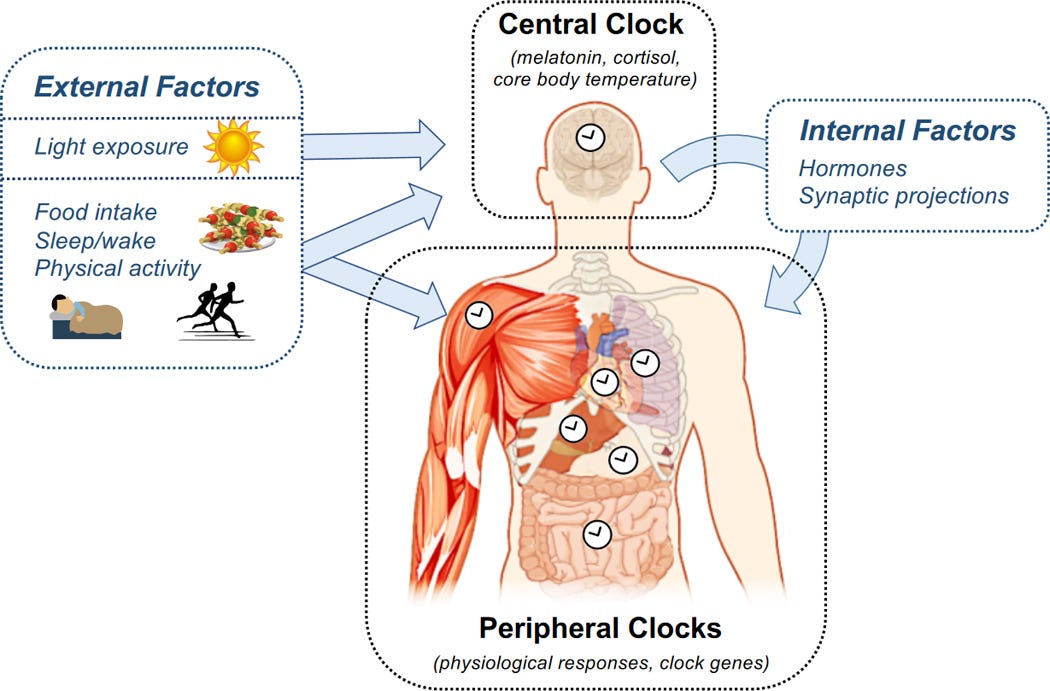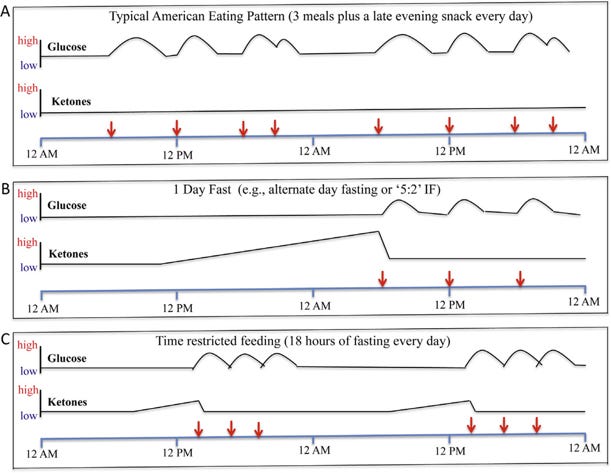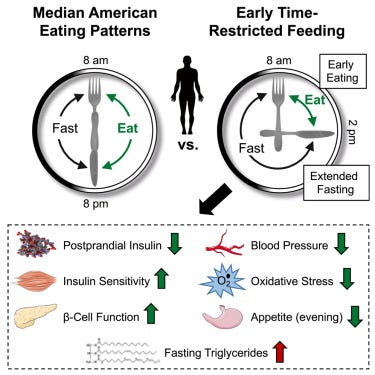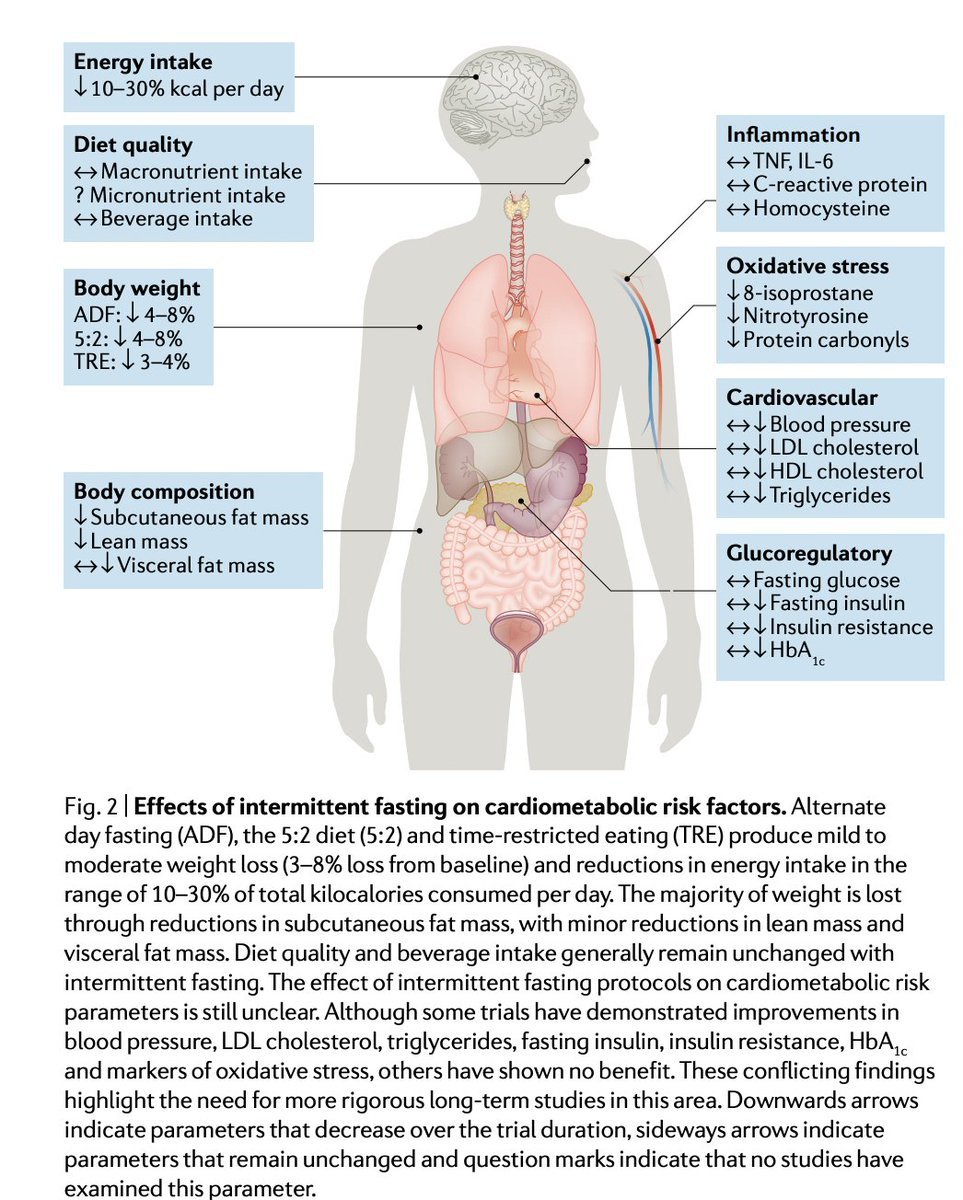Dear Readers,
In the last article we briefly touched upon Intermittent Fasting (IF) and different IF regimens: 16:8 and 5:2 approach. In this article, let’s understand all about IF: a fad diet or backed by science? IF is an eating pattern and not a diet. IF doesn’t rely on continuous caloric restriction neither does it require abstaining a macronutrient (either carbohydrates, fats or proteins) from your meals as opposed to some popular diets like Keto, Paleo, Atkins, Vegan, Dukan, and Carnivore.
Contrary to popular dieting plans, IF doesn’t tell you what to eat but When To Eat.
Eating Patterns or Fasting Protocols of IF:
16:8 IF is a time-restricted eating pattern with 16 hr of fasting and 8 hr of eating window. The idea of this approach is to restrict number of meals intake in a day. Why ? Because, in developed nations, a single person consume at least 4-6 meals per day and typically eat for more than 12 hr each day. Scientific studies show that such binge-eating pattern is linked to rapid rise in obesity and metabolic disorders (like type II diabetes, cardiovascular complications etc.), particularly when coupled with a sedentary lifestyle (no exercise).
IF helps to bring discipline to eating habits. In the 16:8 plan, you can set the 8 hr eating window from either 7am-3pm by skipping dinner or from 1pm-9pm by skipping breakfast. During the eating window, you are not required to count calories or monitor food intake in any way. However, it is advised that during the eating window, don’t go crazy on food and indulge in high-calorie junk food, super sized fried items and high calorie refined sugar treats. If your goal is to get healthier, follow the Mediterranean diet* and avoid ultra-processed foods and refined sugars, whether you are trying IF or not.
During the 16 hr fasting window, you typically spend approximately 8 hr in sleep so basically the fasting window reduces to only 8 hr. Also, in the fasting window, you are allowed to consume zero calorie drinks like water, unsweetened coffee and tea.
5:2 IF is a day restricted diet plan where you consume meals normally for 5 days and restricts eating only 500-600 calories in 2 non-consecutive days of the week. Before the fasting day, make sure to fuel up to avoid overeating when it's time to eat again.
The other IF diet plans include 14:10 (10 hr eating window), alternate day fasting, and warrior diet (4 hr eating window).
Watch this video to understand the benefits of Mediterranean Diet:
Should I skip breakfast or dinner for 16:8 IF plan ?
Studies suggest that our bodies are optimised for food intake in the morning because of higher insulin sensitivity, beta cell responsiveness, and thermic effect of food in the morning than in the afternoon or evening (Morris et al., 2015a; Poggiogalle et al., 2018; Scheer et al., 2009). Based on these studies, it can be understood that earlier eating windows during IF may produce superior metabolic benefits than later eating windows. Some studies validate this notion and support that skipping breakfast (fasting until 11 a.m.) has negative effects on weight management and glycemic control (Geliebter et al., 2014; Levitsky and Pacanowski, 2013; Nas et al., 2017), however others show no harmful effects on these parameters (Chowdhury et al., 2019; Dhurandhar et al., 2014; Sievert et al., 2019). Thus, whether skipping breakfast or extended morning caloric restriction (IF) negatively impact body weight and glucose homeostasis is still unclear.
It is advised that select an eating window which suits your circadian rhythm or internal biological clock (Fig. 1), personality and your social life. If majority of your social eating and drinking events occur in the evening (e.g., eating dinner with family) and you chose IF plan with 7am-3pm eating window, eventually you are more likely to ignore the IF plan. Therefore, pick your eating window wisely as ability to continue to engage in the habitual social eating patterns can play an important role in diet adherence and tolerability.

Benefits of Intermittent Fasting backed by science
IF is not a new concept; in pre-historic times before humans learned farming, it was practiced by our hunter-gatherer ancestors. Even ancient Romans believed in this concept, they used to consume only one substantial meal around 16:00 h. It is after the invention of artificial light and availability of surplus food the concept of three square meals: breakfast, lunch and dinner accompanied with two mid-meal snacks came into existence.
If someone is eating three meals a day, plus snacks, and they’re not exercising, then every time they eat, they’re running on those calories and not burning their fat stores - Dr. Mark Mattson (Neuroscientist, Studied IF for 25 years at Johns Hopkins).
Surplus calories and the sedentary lifestyle pushes you to a life with higher risk of obesity, cardiovascular disease, type 2 diabetes, and other illnesses. IF can be a solution to cut down on calories and give your body down-time to do the necessary repair and rebuild work. Time restricted fasting can also help to decrease weight and benefit cardiometabolic fitness. IF puts your body into mild-stress, referred to as eustress (mild-stress that leads to a positive response), which allows cells to adapt and even enhance their ability to cope with stress and, maybe, resist disease.
It is important to highlight that majority of our understanding of how IF works comes from research done on animals. To date, only 6 human trials of Time Restricted Fasting (TRF) have been performed (Gabel et al., 2018; Gill and Panda, 2015; Moro et al., 2016; Sutton et al., 2018; Tinsley et al., 2019; Wilkinson et al., 2020). However, this is about to change soon, currently around 150 clinical trials are ongoing, ranging from various cancers, diabetes, obesity, mild cognitive impairment and some inflammatory neurological disorders like multiple sclerosis.
Studies in mice using feeding windows of 3–10 hr report that TRF reduces body weight, increases energy expenditure, improves glycemic control, lowers insulin levels, reduces liver fat, prevents hyperlipidemia, reduces infarct volume after stroke, and improves inflammatory markers, relative to grazing on food throughout the day.
Let’s understand the benefits of IF on human health:
IF triggers ‘metabolic switch’ from glucose-based to ketone-based energy: Promotes Fat burning
With each meal, your blood glucose levels increase and then return towards baseline over a period of several hours. When you consume 4-5 meals in a day, your blood glucose levels remain high (Fig. 2). Under these circumstances, body never gets a chance to use the fat reserves because liver glycogen stores are never depleted. This leads to fat build up and down the lane makes you a candidate of obesity-related complications. When your energy intake (i.e. food consumed) is more than energy spent, the surplus energy (i.e. glucose) is stored in the form of glycogen in your liver and muscles. A typical human liver can store up to 700 calories worth of glucose in the form of glycogen. If you're doing moderate activity, it takes 10 to 12 hours to use up those 700 calories.
However, if you don’t eat for 10–16 hours, your body will flip the metabolic switch from the use of glucose (and stored glycogen) and go to its fat stores for energy, and fatty acids called ketones will be released into the bloodstream (Fig. 2). Several studies have reported decreased triglyceride levels with extended fasting time (Tinsley and La Bounty, 2015). Of relevance to weight management, this switch represents a shift from lipid synthesis and fat storage to mobilization of fat in the form of free fatty acids (FFAs) and fatty-acid derived ketones. Furthermore, the ketogenic diet promotes weight loss, as processing ketones requires greater energy.

In this way, IF (time restricted diet with calorie restriction) can promote fat burning and results in weight loss. Few studies have examined the weight-loss efficacy of IF in individuals with obesity (Gabel et al., 2018; Gill and Panda, 2015; Wilkinson et al., 2020). In a recent trial of 8 hr TRF, body weight was reduced by 2.6% after 12 weeks in men and women with obesity (Gabel et al., 2018). Likewise, 10 hr TRF produced 3.6% weight loss after 16 weeks (Gill and Panda, 2015) and 3.0% weight loss after 12 weeks (Wilkinson et al., 2020).
Protects from Free Radicals
Soon after eating a meal your blood glucose levels increase which activates mammalian Target Of Rapamycin (mTOR) pathway in cells. This pathway stimulates the cells to uptake glucose and also amino acids which comes from the breakdown of proteins in your diet. These amino acids and glucose help the cells to enter a growth state. However, while in a growth state, they are also accumulating molecular garbage. If this growth phase stays chronically ON, there will be accumulation of garbage, free radicals, and dysfunctional mitochondria. Intermittent fasting promotes garbage disposal by a process called Autophagy.

Effect of IF on Cardiometabolic Health
Boosting Brain Function
Studies show that aging-related neurodegenerative diseases like Dementia, Alzheimer’s, Parkinson diseases are accelerated by surplus energy and sedentary lifestyle. IF can help to improve brain function and thus reduce your chances of developing these debilitating diseases with age. Animal studies have shown that IF can increase the levels of Brain-Derived Neurotrophic Factor (BNDF) which is crucial for cognitive performance and brain health. Listen to a talk by Mark Mattson explaining the role of IF on Brain resilience.
More human studies are needed to ascertain the effect of IF on boosting brain function.
IF can improve health even in the absence of weight loss
In 2018, Sutton and colleagues published findings of proof-of-concept study in prestigious Cell Metabolism journal describing the benefits of IF independent of weight loss. The trick? Eat early and for only 6 hr of the day. Figure 3 summarises the physiological changes observed in 8 men with pre-diabetes after 5 weeks of IF (early TRF): improved insulin levels, insulin sensitivity, β cell responsiveness, blood pressure, and oxidative stress levels when compared to control arm. This first randomized controlled trial showed that IF has benefits independent of food intake and weight loss in humans.

IF improves some aspects of cardiometabolic health in men with prediabetes—a population at great risk of developing diabetes—and indicates that IF is an efficacious strategy for treating both prediabetes and likely also prehypertension.
IF is not for everyone
IF is generally safe and produces few gastrointestinal, neurological, hormonal or metabolic adverse effects including hunger, eating disorder in adolescents, constipation, irritability, headaches, and bad breath. However, it is not recommended for people with hormonal imbalances, pregnant and breastfeeding women, and diabetics. Moreover, people with eating disorders, a BMI under 18.5, and underweight people are also not recommended to use the IF diet.
Conclusion
Intermittent Fasting is an eating patten and not a diet! IF shows promise for the treatment of obesity, improves cardiometabolic risk factors such as blood pressure, levels of LDL cholesterol and triglycerides, insulin resistance and HbA1c and effect on boosting brain health. As we move forward in our understanding of how different IF eating-patterns benefit health, more questions emerge, from basic mechanisms to implementation for improvements of clinical conditions or sustained good health. Future of IF is promising and ongoing 150 clinical trials will further help us to better understand the role of IF in overall health of mind and body.
If you’re interested in trying out IF, check with a healthcare professional first to ensure it’s a safe and appropriate choice for you.



